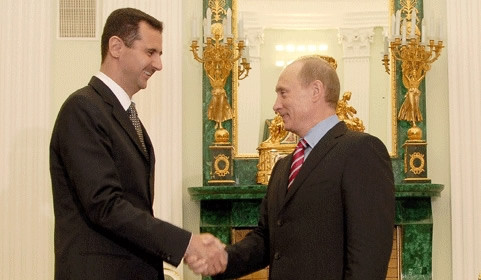Jonathan Saul reports for Reuters:
In recent weeks Russia has stepped up supplies of military gear to Syria, including armored vehicles, drones and guided bombs, boosting President Bashar al-Assad just as rebel infighting has weakened the insurgency against him….
Several sources told Reuters that Assad’s forces had since December received deliveries of weaponry and other military supplies, including unmanned spy drones known as UAVs, which have been arranged by Russia either directly or via proxies.
See Russia’s “Geneva II” Strategy to Prop Up Assad – Redefine Conflict As “War On Terror”
“Dozens of Antonov 124s (Russian transport planes) have been bringing in armored vehicles, surveillance equipment, radars, electronic warfare systems, spare parts for helicopters, and various weapons including guided bombs for planes,” a Middle East security source said.
“Russian advisers and intelligence experts have been running observation UAVs around the clock to help Syrian forces track rebel positions, analyze their capabilities, and carry out precision artillery and air force strikes against them,” said the source, who declined to be identified.
Vyacheslav Davidenko, spokesman for Russia’s arms export monopoly Rosoboronexport, said they could not comment on arms deliveries to Syria.
Russia has said it violates no international laws with its military supplies to Syria and does not sell Damascus offensive weapons.
Syrian officials could not be reached for comment.
***
A source within the international arms industry with knowledge of Middle Eastern weapons movements also confirmed a pick-up in supplies to Assad’s forces, including UAVs.
“Equipment has been moving into Syria, and Russia is either bringing it in themselves or sourcing supplies from Black Sea areas like Bulgaria, Romania or Ukraine, where there is surplus stock floating around,” the source said. “Suppliers in that region cannot afford to upset the Russians.”
Arms trackers say Bulgaria, Romania and Ukraine all have stockpiles of Russian-styled light arms that were produced in the countries dating back to the Soviet era, when factories were set up with help from Moscow.
A Bulgarian foreign ministry spokesman said Bulgaria’s intergovernmental council, which oversees arms trades, had not issued any certificates for arms deals destined for Syria.
“We have data that shows that Bulgaria has not authorized any arms sales to Syria,” he said.
Former foreign minister Solomon Passy said it was “very unlikely” that Bulgaria, as a NATO and EU member, would be involved in such shipments.
A Ukraine foreign ministry spokesman said the former Soviet republic had already denied allegations of arms supplies and transfers last year when it said Kiev had voluntarily and completely stopped military and technical cooperation with Syria since May 2011.
Romania’s foreign ministry said its export control department had not registered or authorized any foreign trade operations involving military products, including light weapons, with Syria during 2013 or 2014.
The arms industry source said: “Stuff is definitely coming into Syria, and Russia realizes they have to keep Assad in power if they want to keep a hold of what they have there, especially with oil and gas reserves up for grabs.”
Russian oil and gas company Soyuzneftegas signed a $90 million deal with Syria’s oil ministry in December for oil exploration and production in a 2,190 square kilometers (845 square miles) bloc of Mediterranean waters off the Syrian coast between Tartous and Banias.
Syrian oil officials say they are confident their waters hold significant oil or gas reserves, pointing to substantial discoveries in the eastern Mediterranean off Israel and Cyprus and promising surveys carried out in the waters of Lebanon.
Moscow says its Middle East diplomacy is based on standing up for the principles of international law and upholding the role of the United Nations.
The situation also offers Russia an opportunity to show it still has weight on the world stage and to win potentially lucrative contracts once the fighting is over in Syria and the dispute over Iran’s nuclear program ends.
Russia is particularly keen to establish and keep a foothold in the Middle East through Syria and Iran because it lost out during the Arab Spring revolutions, particularly in Libya, where it had backed Muammar Gaddafi.
Reuters last week revealed that Russia is negotiating with Iran an oil-for-goods swap worth $1.5 billion a month that threatens to undermine sanctions that helped persuade Tehran to agree a preliminary deal to curb its nuclear program.

